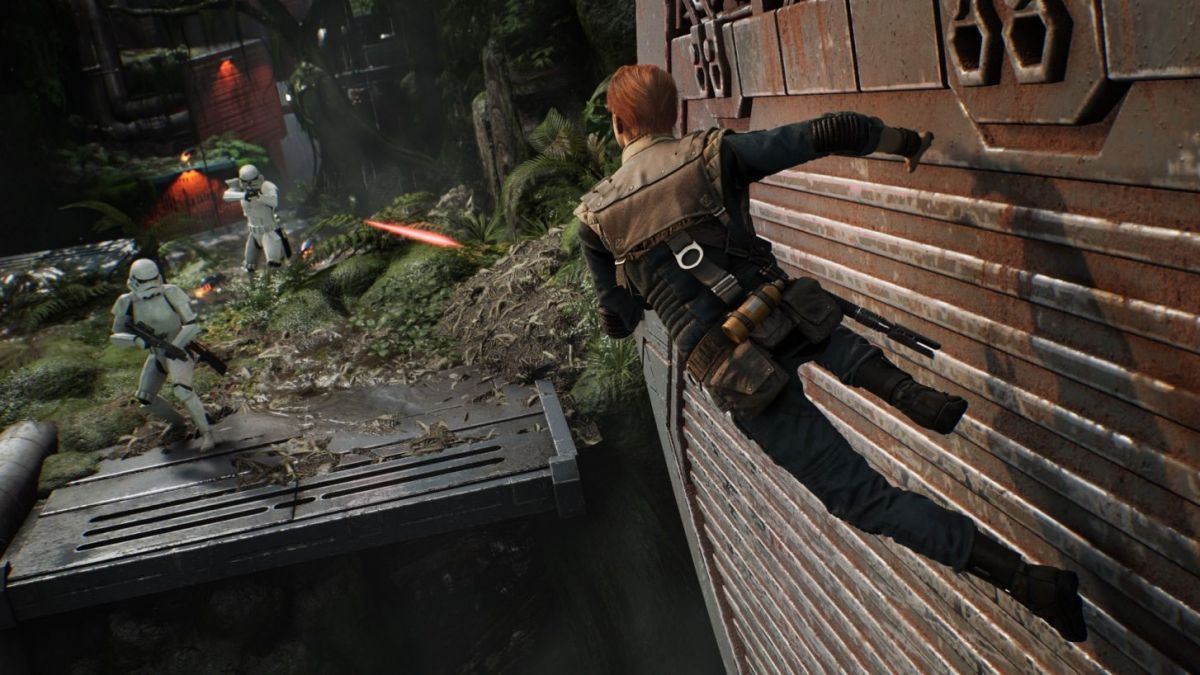
Zoom in on a fishery in Anno 1800 and you’ll word males dangling rods off the tip of a rickety pier, whereas others carry packing containers full of the day’s catch to storage, ready to be transported. Zoom in on the pub and you’ll word women and men sitting on picket benches sipping beer, listening to a band in brightly coloured garments bang on drums.
Blue Byte has gone to good lengths to promote its Nineteenth century setting, right all the way in which during which all the way in which right down to replicating the types of crops that you just simply’d’ve present in its South America-inspired New World on the time, nevertheless it’s imprecise about any precise historic context. That is deliberate—the dev workforce says it is purported to be a “tongue-in-cheek celebration” of the interval “by the use of which interval, place and identification blur.”
Nonetheless as I lay out one totally different totally fashioned sq. of apple timber reverse a sheep farm, I am unable to assist nonetheless marvel: How heaps, if one factor, can Anno educate us in regards to the easiest method European folks lived, labored and colonised within the midst of the Nineteenth century? I spoke to 2 consultants to hunt out out, one an industrial archaeologist, the choice a historian on the Atlantic World. They instructed me that in some methods Anno 1800 is meticulous—nonetheless in others, notably on slave labor and the expertise of the native folks all by means of colonisation, it’s miles from actuality.
Improvement and bust
In some large methods, although, Anno 1800 is nothing much like the Nineteenth century.
Let’s start with the methods Anno 1800 steers closest to the actual fact, beginning with the short progress of your cities. The rise of commerce contained in the Nineteenth century induced cities to broaden as folks moved from the countryside for work, says Ashley Tuck, archaelogist at charity Wessex Archaeology in Sheffield. For example, “textile manufacturing was initially a cottage commerce occurring in a shed hooked as a lot as a farm, and as factories started to be develop folks would swap from the farms to the cities to work in these factories,” he says.
Anno 1800 furthermore reveals the significance of commerce all by means of this era. You can commerce with utterly totally different industrialists to amass objects you may’t produce ample of, and this occurred in real-life cities resembling Sheffield. The town grew off the as soon as extra of its native belongings—water energy, charcoal, and coal—nonetheless imported Swedish iron was important for its well-known metallic commerce. Distinguished instrument producer John Kenyon spent additional time “as a service provider, importing grain from Russia and exporting objects to America and the Baltics,” Tuck says.
The easiest way whereby your Anno 1800 residents change over time from farmers to staff to retailers may characterize a simplified model of the simplest means folks gained abilities within the midst of the Industrial Revolution by the use of apprenticeships, Tuck says, or the simplest means generations in a household labored in fairly just a few sectors. “A farmer’s son or daughter may flip proper right into a employee, and their offspring may flip into an artisan, so there’s parallels there.”

All through the New World, Anno 1800 “captures the exoticism” that Europeans noticed in far-off islands, says Dr. Nicholas Radburn, a lecturer contained in the historic earlier of the Atlantic World on the College of Lancaster. “When folks got here round on ships to seek out or colonise, they’re actually struck by the pure world they’re accompanying—the tropical forests, the distinctive pure world, the waterfalls, the native climate, the little crocodiles you see wandering spherical contained in the recreation. Europeans as late because of the 18th and Nineteenth century are nonetheless sketching these and writing about having seen them,” he explains.
Europeans counting on colonies for objects can even be true. As confirmed contained in the recreation, these “fields of monocrops” on plantations had been grown to be despatched as soon as extra to the Earlier World. The types of issues in Anno 1800—sugar, tobacco, espresso, cotton—furthermore mirror actuality. Ahead of Europeans colonised the New World these had been luxurious objects, nonetheless that they’d been later seen as necessities. “The concept to bolster folks’s lifestyle in Europe it’s good to pay cash for factors which is able to solely be grown abroad notably climates and areas, that rings pretty true with historic earlier,” he says.
In Anno 1800 you play a person inserting out into the New World—this furthermore reveals exact life. “It isn’t state-directed… it is folks doing their very private subject, enhance factors for his or her very private income, and that is what usually types these New World firms, Radburn says. “Usually, they’re personal firms, personal people, with a little bit bit little little bit of very free state backing. So that you just simply see some parallels there.”
In a single different large methods, although, Anno 1800 is nothing much like the Nineteenth century.
God superior
A part of the reason is merely all the way in which during which all the way in which right down to Anno’s nature as a city-building recreation. You discovered a mannequin new settlement on an empty island contained in the Earlier World, lay out roads and place down buildings. These “clear slates” merely did not exist contained in the Nineteenth century, Tuck says. “You’d should go right as soon as extra into prehistory to hunt out locations that weren’t touched by humankind.”
The thought-about a single specific individual controlling the development of a metropolis or metropolis would even have been alien. Whereas there’s proof of industrialists designing mannequin settlements contained in the 18th century, these cities did not pan out as supposed due to the wants of assorted residents and businesspeople conflicted with the distinctive plan, creating “piecemeal” improvement, Tuck says.
I do not suppose Anno 1800 might probably be as pleasurable when you did not have full administration—which may be a easy concession for recreation design—nevertheless it’s attention-grabbing to consider how metropolis growing in video video video games differs from what occurs, or occurred, in real-life.

Anno 1800 touches on staff’ rights and dealing circumstances, and also you may push your inhabitants to work further sturdy and further sturdy if you happen to’re transient on belongings. Fires get away in workplaces, and in case your residents are sad they could riot. Nonetheless Anno 1800 nonetheless would not seize merely how unhealthy circumstances had been for the working class within the midst of the Industrial Revolution, Tuck says.
Staff usually did not obtain any cash, and had been as a replacement paid in objects, leaving them unable to purchase utterly totally different requirements. They may lose arms in instruments and child labor was commonplace. “Folks weren’t involved with the happiness of staff, that they’d been involved with cash or manufacturing,” he says. “I latterly be taught some letters the place the proprietor of a steelworks was boasting about how labour was a purchaser’s market in Sheffield, and he was boastful of how he did not pay them any cash.”
All through the time interval that Anno depends upon—the mid 1800s—these pristine islands merely did not exist contained in the New World.
Nonetheless Anno 1800’s starkest departure from historic earlier comes if you land contained in the New World and uncover pristine islands, ripe for colonisation. All that is required is to assemble a commerce publish, and from there you may pluck belongings from the islands to ship as soon as extra to the Earlier World.
All through the time interval that Anno depends upon—the mid 1800s—these types of islands merely did not exist contained in the New World, says Radburn. There have been “primarily no areas of the Americas which are every uninhabited or undiscovered,” and Europeans weren’t nonetheless crusing ships to rearrange colonies. That occurred earlier, starting with the voyages of Christopher Columbus contained in the 1490s. The Caribbean was quickly colonised inside the next 30 years, whereas utterly totally different elements of the Americas had been colonised contained in the sixteenth, seventeenth and 18th century.
These islands weren’t empty when Europeans discovered them, every. The New World was “almost completely inhabited by Native Folks”—and Europeans “every enslaved or worn out” these folks, Radburn says.

“The acquisition of colonies is a method of conquest. Inside the event you check out Mexico, South America, modern-day Peru, these had been actually conquered, and contained in the Caribbean they’re sending out expeditions of armed males with canines and horses to beat full islands.” After Europeans arrived, Native American populations declined quickly, largely attributable to launched illnesses, nevertheless furthermore attributable to pressured labour, cruelty and warfare, Radburn explains.
When these populations dropped, Europeans realised they did not have ample staff, and shortly modified them with enslaved Africans launched over by the transatlantic slave commerce. “You can say, okay, that is not occurring in 1800, nonetheless it’s, and that occurs right up till the late Nineteenth century,” Radburn explains.
“They do not abolish slavery in Cuba till 1886, in Brazil till 1888, and in US till 1865. The Nineteenth century is a world by the use of which slavery was nonetheless very heaps a part of the world financial system.” Numerous the belongings contained in the recreation had been, in reality, fastidiously tied to slave labour: Cotton, for example, was grown “nearly solely by slaves contained in the American South till the Civil Warfare,” Radburn says. Espresso was produced by slaves in Brazil contained in the Nineteenth century, and sugar by slaves in Cuba.
None of that is tackled in Anno 1800.
A missed varied
You may argue that the closest parallel to your Anno nation is Britain, which abolished slavery contained in the mid-Nineteenth century, and subsequently the absence of slavery is wise traditionally. Radburn furthermore explains that there have been Spanish-speaking cultures contained in the Nineteenth century that had grown from colonised Native Folks, and probably the jornaleros and obreros that make up your New World cities characterize these folks.
Nonetheless to make that work requires an infinite historic fudge. By the aim Britain had abolished slavery, and by the aim these Spanish-speaking cultures had been in full stream, Europeans weren’t crusing to the New World to colonise. Whichever means you check out it, it is not attainable to decouple colonisation from slavery, from cruelty, from violence and illness.
When requested beforehand, the devs have acknowledged they did not embody slavery due to it could be sturdy to handle sensitively. “We do not suppose {{{that a}}} recreation like Anno, and likewise we as builders, can cowl this matter in an appropriate means,” they acknowledged in a Q&A again in 2017. “We’re focussing on a recreation which delivers a pleasurable methodology expertise set contained in the given setting.” Later, inventive director Dirk Riegert talked relating to the potential difficulties of together with slaves as a recreation mechanic with German publication Focus.

One NPC is a former slave, so clearly slavery exists in Anno 1800’s world, nevertheless it’s occasionally contained in the highlight.
Radburn acknowledges that having the ability to commerce slaves in Anno 1800 might probably be “ugly.” “I do not suppose anyone would actually wish to play a recreation the place your job was to go over to islands, conquer native folks, import slave laborers, vitality them to work after which import additional slave laborers to vary those that perish. That is merely terribly ugly and will probably be reasonably insensitive, notably due to the descendants of these enslaved individuals are nonetheless alive as we talk.”
Video video video games which had been able to embody slavery have largely been fictional: Stellaris, for example, added slave shopping for and promoting closing yr. Frostpunk, the horrible metropolis builder, will allow you to ship youngsters to work to spice up manufacturing. Anno 1800’s historic grounding means it is comprehensible that Blue Byte would tread cautiously, nonetheless I actually really feel it is a disgrace slavery won’t be acknowledged additional immediately.
One NPC is a former slave, so clearly slavery exists in Anno 1800’s world, nevertheless it’s occasionally contained in the highlight, and there is a lot the group may’ve accomplished with out actually permitting the avid avid gamers to commerce slaves. Omitting them conveniently ignores an infinite a part of the historic earlier of industrialisation, and an inextricable a part of the time interval Anno is celebrating.
Radburn’s concern is that avid avid gamers will assume the cherry-picked model of the sooner is near actuality, and he components out than not one among many 23 recommendations beneath the developer weblog on historic accuracy degree out, or ask about, slavery.
Nevertheless probably there’s operate to be optimistic. Radburn, who has carried out lots of the earlier Anno video video video games, thinks the mannequin is an setting pleasant methodology to “get avid avid avid gamers obsessive about historic earlier.” For some avid avid gamers Anno 1800 will hopefully be a springboard to discovering out books or visiting museums, to be taught the place actuality and recreation diverge. It labored for me: The ingredient Blue Byte painted into Anno 1800’s world, nonetheless traditionally inaccurate, has pulled me into that interval and made me wish to uncover out additional. I hope it does the equal for others, too.
Blue Byte and Ubisoft didn’t remark in time for publication of this textual content material.









